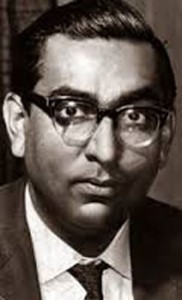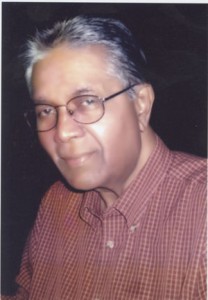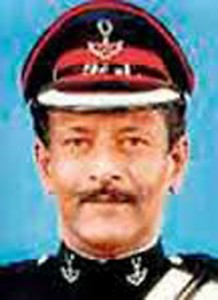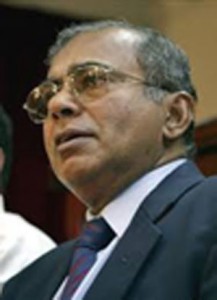Appreciations
View(s):FELIX R. DIAS BANDARANAIKE- On his 86th birth anniversary
He questioned the status quo and challenged many sacred cows
 Felix R. Dias Bandaranaike was a contemporary of my brother at Royal College, with whom he edited the College Magazine. I still recall vividly the oversized schoolboy on a battered bicycle, cycling down the lane where we lived. However, it was I who had the unique opportunity of observing Felix at fairly close range, of working with him at the Bar, in Government and in Opposition, and of knowing him as a friend, in good times and bad, for over twenty years. He was a man of extraordinary courage and ability who straddled the political stage of this country for two decades and dignified it with his presence. He offered this country a quality of leadership that was comparable to the best anywhere in the world. He brought into the national life of this country qualities which are barely discernible in the political scene today; or perhaps more accurately, are now more the exception than the rule.
Felix R. Dias Bandaranaike was a contemporary of my brother at Royal College, with whom he edited the College Magazine. I still recall vividly the oversized schoolboy on a battered bicycle, cycling down the lane where we lived. However, it was I who had the unique opportunity of observing Felix at fairly close range, of working with him at the Bar, in Government and in Opposition, and of knowing him as a friend, in good times and bad, for over twenty years. He was a man of extraordinary courage and ability who straddled the political stage of this country for two decades and dignified it with his presence. He offered this country a quality of leadership that was comparable to the best anywhere in the world. He brought into the national life of this country qualities which are barely discernible in the political scene today; or perhaps more accurately, are now more the exception than the rule.
In the past thirty years, I have lived in four countries – Hong Kong, Canada, Germany and the United Kingdom. In each of them, it is considered axiomatic that anyone who is presumptuous enough to enter public life and claim the right to govern his or her fellow beings, must have something to offer. To be able to give, one must possess. If one possesses little or nothing, and therefore cannot give, he or she will be inclined to take and to collect and to accumulate. What Felix possessed, and therefore what he offered his country, liberally and in generous measure, was his supreme professionalism. His sharp, acute and incisive mind; the rigorous regime of discipline to which he subjected himself and those who worked with him; his continuing quest for knowledge; his deep understanding of men and matters acquired in the course of a brief but remarkably successful legal career; and his tremendous capacity for sustained effort – all these combined to mould him into a true professional.
How else could he, with no formal training whatsoever in the detection of crime, have personally investigated and successfully elicited, in barely 48 hours, all the evidence necessary to satisfy a bench of three Judges of the Supreme Court that senior officers in the police and the armed services had conspired to overthrow the lawfully elected government of the country? In 1971, when the police confessed their inability to interrogate the thousands of idealistic, ideologically committed youth who attempted to capture political power by attacking all the police stations in the country in a single night, it was Felix who assembled a team of special investigators comprising the brightest and the best in public administration and the law to perform that unenviable task. Felix reached out to achieve excellence, and he demanded that others did so too.
Felix possessed integrity, absolute incorruptabilty. I recall his mentioning to me after his first term in Government that in order to serve as a cabinet minister and not have to accept bribes and commissions, one needed to receive a fairly substantial private income. Since he could not practise law while in office, Lakshmi and he provided for that eventuality in his first five years in Opposition, by establishing a farm and developing and expanding it, as conscientiously as he approached all his other tasks. It was singularly ironic that his farm, and the perfectly circumspect manner in which Felix had instructed that its produce be disposed of – to the appropriate state corporations at the daily published price, rather than in the open market to the highest bidder – should have formed the basis of the charges on which the Special Presidential Commission constituted by J.R. Jayewardene recommended that he be stripped of his civic rights – a dubious honour which Felix shared with Mrs Bandaranaike and me. His absolute integrity, grounded upon a strong spiritual commitment was exemplified when his erstwhile antagonist, Rohana Wijeweera, chose to retain him as his counsel to challenge the conduct of the infamous referendum of 1983.
There was another quality which Felix possessed in abundance, and that was imagination. I recall the lengthy and detailed report we received from the Law Commission in response to our request for the simplification of the tedious and prolonged court proceedings relating to testamentary actions. His response was both swift and focused. Why, he asked, do the near relatives of a deceased person have to parade themselves in a court of law? His solution was to remove from the judiciary all but the disputed elements of testamentary jurisdiction, and to locate in every District Court Registry a probate officer functioning under the Public Trustee to make all the necessary orders to enable the bereaved families to continue with their lives with the least inconvenience or disruption. Felix was an innovator who constantly and unceasingly questioned the status quo and challenged many sacred cows. The Administration of Justice Laws of 1973 and 1975 which we drafted sought solutions outside the traditional framework, and had they not been repealed in 1977 would have averted the scandalous state of our judicial system today.
I did not necessarily agree with everything Felix said or did. In fact, he attempted to persuade me not to accept Mrs Bandaranaike’s invitation to be Permanent Secretary to the Ministry of Justice, arguing that at the age of 32 my future lay in the legal profession and perhaps in the judiciary. There was even one occasion when he reported me to the Prime Minister for refusing to carry out his instructions. Nevertheless, it is with gratitude that I remember the stimulating and satisfying experience of having worked with a man of extraordinary talent, a person with a brilliant incisive intellect who dignified the political stage of this country for a brief moment in its history, and who at the same time was an incorrigible wit, a very human person who enjoyed the simple pleasures of family life.
- Nihal Jayawickrama
Harendra de Silva
Looking back on a beautiful friendship
 It was a bright sunny morning in July 2005 when I walked down a pathway strewn with Ahala flowers – fallen from the floral cascades above; the venue was a well known hospital in Colombo.
It was a bright sunny morning in July 2005 when I walked down a pathway strewn with Ahala flowers – fallen from the floral cascades above; the venue was a well known hospital in Colombo.
As I limped into the patients’ waiting room with some trepidation, I caught sight of a calm, contemplative gentleman taking a seat, accompanied by an European looking lady on a cane. I little realized then that they were going to be “kalyana mithrayo” to us. They were no other than Harendra and Neleeka de Silva.
Days sped by, and we bumped into the couple again in Kataragama where we got talking. This was the commencement of a beautiful friendship which was sadly interrupted by Hare’s untimely demise two years ago.
Hare’s signature buzzwords were “Metta” and “Dhana”. He was an ardent and devoted Buddhist. He inspired me with his liberal and tolerant attitude and exemplary actions in the implementation of the tenets of Buddhism.
He gave Dhana to the monks on a regular basis – not only to the clergy in the temple but also to those monks in meditation at the Aramaya that he visited. In this venture he was ably supported by Neleeka who prepared and still prepares the Dhana with meticulous attention to detail. Not only did he engage in Dhana, he encouraged the rest of us to duly participate in conjunction, strictly on our terms, thus sharing in the merit accruable.
Another significant act of his was the dissemination of the Dhamma. He would painstakingly explain in detail salient features of life in the light of Buddhist doctrine. He substantiated this further by purchasing appropriate literature for distribution. If the required publications were out of print, he would take the trouble to photocopy and bind the literature at his personal expense and hand it over. To me a Hindu Tamil, he selected suitable written works in English and went to extents to explain the underlying concepts of the Dhamma. He possessed an invaluable library of books on Buddhism and allied topics which was generously donated to the New England Buddhist Vihara in the US after his demise.
His domestic staff he treated with unrivalled dignity. Their emoluments comprised not only of a salary with meals and beverage but regular provision of dry rations as well for the family. Reimbursement of medical expenditure was also undertaken. When cheated, he reprimanded them and forgave in genuine altruistic manner.
He was a true son of Mother Lanka and to reiterate, a staunch practising Buddhist. His demise has created an irreparable vacuum in the midst of his close associates. May he attain the golden goal of Nirvana which he strived and aspired for during his tenure of 74 years.
In consolation to Neleeka and members of his family, I quote below from the Bhagavad Gita –
For death is certain to one who is born, to one who is dead birth is certain. Therefore thou shall not grieve for what is unavoidable.
- Kiru Jayatilaka
Major Raja Amarasekera de Silva
I hold onto loving memories
 It is eight years to this day 24th of October
It is eight years to this day 24th of October
You left us so suddenly, when you left a part of me died with you
I live for the sake of our two lovely daughters
And it is sad you could not see as teenagers the two lovable sweet granddaughters
How much I miss you words cannot express
It is the loving memories you left behind that keeps me sane
May you attain the supreme bliss of Nirvana
- Your ever loving wife
C.R. De Silva
He did the right thing and stood for the rights of others
 President’s Counsel, former Attorney General and Chairman, Lessons Learnt and Reconciliation Commission (LLRC) C.R. de Silva, fondly known as “Bulla” was an individual with exceptional qualities. His unexpected demise on November 7, 2013 was an irreparable loss to the country in general and the legal fraternity in particular.
President’s Counsel, former Attorney General and Chairman, Lessons Learnt and Reconciliation Commission (LLRC) C.R. de Silva, fondly known as “Bulla” was an individual with exceptional qualities. His unexpected demise on November 7, 2013 was an irreparable loss to the country in general and the legal fraternity in particular.
His was a life full of selfless care for others. He was a tower of strength to his peers, subordinates and friends. His gentle and amiable manner, his agile mind, devotion and dedication to duty and assuming responsibility were par excellence. His sense of humour, warmth and humility were the hallmarks of his personality.
Mr. De Silva was a person with extraordinary qualities. The exceptional feature in his character was his calm and cool temperament. He took everything with a smile, be it hard or jubilant times. He was never tremulous or ruffled during any situation. Instead, he used to chuckle and crack a joke making others smile. His friendly and cordial behaviour was admired by everyone.
He never demanded recognition but earned it through sheer display of professionalism. In his professional conduct whatever he did, he accomplished successfully through commitment, hard work and dedication. He was a brilliant prosecutor who loved to meet challenges and rebuffed the defence by use of adventurous strategies with confidence. He was well versed with his brief and never looked back to losing the cases he prosecuted; such was his commitment. It was a hard fought battle in the courtroom with a lot of noise, giving no chance for the opposing Counsel. That was C.R. de Silva.
As a member of the official Bar, from the commencement of his career as a young State Counsel and at different positions he held in the hierarchical structure at the Attorney General’s Department until his retirement having reached the pinnacle as the Attorney General, he upheld the dignity and decorum of his office throughout, maintaining his stature in an eminent and distinguished manner. He rendered a yeoman service to the Attorney General’s Department, which will always be well remembered in the years ahead. His legacy will remain within the walls of this esteemed Institution.
I came to know Mr. de Silva closely from his young days as a State Counsel during my early days in the CID and over the period of time until his untimely demise I had the good fortune of working with and associating with him very closely. I witnessed his greatness as a masterly prosecutor and as an excellent strategist in handling prosecutions. He was a committed person when he got down to business and displayed his ability not only in the application of legal theories but also his approach during situations requiring practical know-how. He always displayed a high sense of responsibility and dutifulness.
I also had the opportunity to travel overseas on official work with him on many occasions, both for the conduct of investigations which bore international ramifications and also as a member of the Sri Lankan Delegation to attend the United Nations Human Rights Council sessions in Geneva. His forthrightness, efficacy and forcefulness contributed to the success during such visits. He was a professional with a vision, farsighted in his approach and had the disposition to fashion things with reverence. To him, the country and his professional duties came first.
He led from the front and always believed in team spirit, be it in the Attorney General’s Department and or with other stakeholders when it came to discharging his duties and responsibilities. The consultations I had with him in his chambers and at his residence at times during my tenure as the Director/CID and subsequently as the DIG/CID were always long drawn, at times even burning the midnight oil. At the end of these arduous sessions we were sure to get one thing in the end; that was a good feast on his account. So were his generosity, hospitality and friendliness.
He never felt uneasy over enduring dissent nor was he hesitant to agree with opinions expressed even by us if they were correct in the best interests of a case under investigation during the consultations. Such was his humbleness. He was a professional who always gave a patient hearing to right thinking opinions and accepted them in true spirit.
The role he played in spearheading an eminent team as the Chairman of the Lessons Learnt and Reconciliation Commission (LLRC), at a crucial time of a biased onslaught on Sri Lanka by some quarters in the international community, subsequent to the end of a bloody conflict, is highly laudable and its final report will no doubt go into Sri Lanka’s history books. The LLRC Report, needless to say, is a comprehensive document, fully independent and exceptional, judging by any standards and is now acclaimed internationally by many countries. He served the country and was least interested in or sought anything for his personal benefit and glory.
Though unknown to many, he was a social worker and philanthropist who silently engaged in various humanitarian and other social projects for the benefit of the needy.
He was a gentleman who had the courage to abide by his principles without fear or favour however hard it was and whatever consequences he had to face. He had the strength to simply do the right thing and stand for the rights of others, a quality we rarely witness today from those engaged in various professions. This was the stature of this distinguished personality.
A good sportsman of yesteryear, particularly in the field of rugby, he always played the game well within the rules both on and off the field and this was conspicuous not only in sports, but also in his professional duties. This earned him the admiration, respect and high regard of everyone. An amiable personality, he was loved by all.
To his family he was a magnanimous husband and father to his three sons, to his alma-mater he was a caring son, to his subordinates and colleagues he was a citadel and guardian, to his friends he was a true friend, to those who associated with him he was a good human being, to the needy he was a philanthropist, to his litigants he was the liberator and a rescuer. This was C.R. de Silva.
His third death anniversary falls on November 7. A Trust Foundation has been established in his name to continue with his vision. I consider it a source of pride as one of the Trustees to be a stakeholder of the Trust, to contribute towards the realization of his vision.
His name will always be engraved in our hearts and minds.
May he attain the supreme bliss of Nibbana.
- Asoka Wijetilleka
| Memorial orationThe Trust will have its commemorative oration at the BMICH on Monday, November 7. The Memorial Oration will be delivered by President’s Counsel and former Attorney General of Sri Lanka, Palitha Fernando. This event will also coincide with the launch of the autobiography of late C.R. de Silva by the Royal College 1962 Group.
|
Indira Fortune Ratnam Nee Navamanie
Our need for you will never abate
You left behind memories of gold
Ours now to treasure and to hold;
Within our hearts you’ll always stay
Loved, missed and remembered everyday
Images of you fill our thoughts
Beloved daughter, sister, wife, mother
A friend sincere to all in need
Thoughtful, gentle, full of good deeds
God looked down on his creation
Saw a life that was a celebration,
Held out his hand and took you in
The crown of life for you to win.
In pain and suffering you ministered still
Subduing self with his grace and your will,
A thoughtful word, a gentle smile
To all who called on you a while.
We watched you wither day by day
Though we willed it, you could not stay,
Our need for you will never abate
But heaven’s need was not for debate.
Now crowned in gold, our golden girl
You’ve left behind hearts in a whirl,
Broken we whisper, ‘God knows best’
As you enter God’s eternal rest.
Amidst the sorrow, shock and pain
Hope whispers gently, ‘We’ll meet again’
Someday on that golden morrow
God will wipe away all our sorrow;
Together again forever more;
In God’s eternal home on high
Never a need to cry or sigh
Thank you for all you are and were to us
Ever loved, missed and remembered
- Albert, Rukshan, Dharshini, Shyamala, Mummy, Dadda, Ronald & Ranjana


